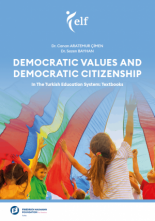Year: 2019
Authors: Dr. Canan Aratemur Çimen and Dr. Sezen Bayhan
At the beginning of the twenty-first century, education for democratic citizenship attracted renewed attention, both nationally and internationally, because of the challenges raised by globalisation, migration, increasing inequalities and racism (Osler and Starkey, 2006), and the corollary concern for responding to such challenges that could pose a risk to the culture of living together within diversity.
As a country home to a broad range of ethnicities and religious orientations as well as increasing numbers of migrants, similar concerns hold for Turkey; hence the need for a civic education capable of cultivating citizens critical of discrimination and violence of all sorts and willing to act in accordance with the principles of human rights and democratic values has become greater than ever. Education is one of the most important instruments for the cultivation of values associated with democratic citizenship.
Promoting a worldview that embraces the values of freedom and equality and facilitating peaceful coexistence among people with a diverse set of ideas, lifestyles, and spiritual/religious orientations is only possible through the cultivation and internalisation of democratic values and the culture of democracy. Therefore, it is crucial to practice the principles of democracy at educational institutions and design educational materials that promote democratic citizenship and human rights. By focusing on how Turkey’s textbooks discuss democratic citizenship and democratic values, this report aims to understand the strengths and weaknesses of the textbooks in this regard and serve as a resource for practices and studies that work towards strengthening the culture of democracy.
